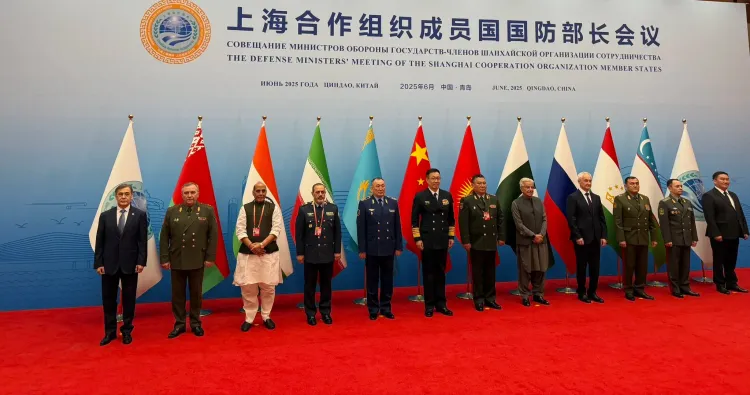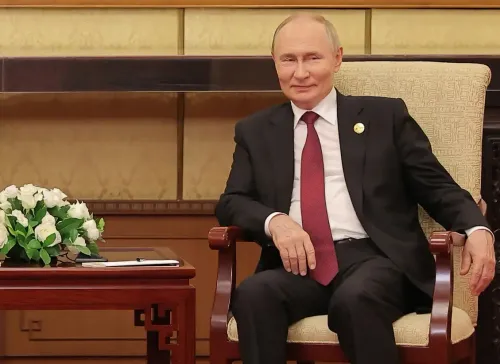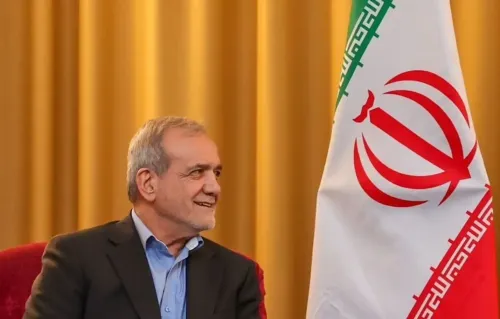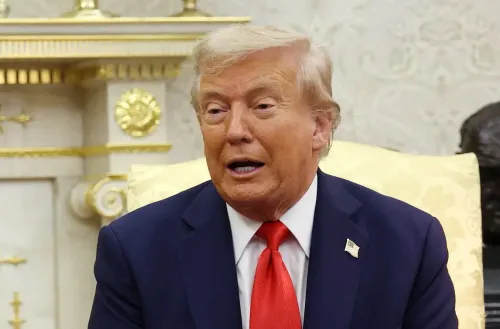Can Terror and Peace Co-Exist? Rajnath Singh at SCO Meet in China

Synopsis
Key Takeaways
- Rajnath Singh emphasized the necessity for collective action against terrorism.
- Peace and prosperity cannot coexist with terrorism and WMD proliferation.
- Accountability for terrorism sponsors is critical.
- India maintains a zero-tolerance policy toward terrorism.
- Cooperation among SCO members is essential for regional stability.
Qingdao (China), June 26 (NationPress) Defence Minister Rajnath Singh emphasized the urgent need for collective and decisive action against terrorism and the proliferation of weapons of mass destruction (WMDs) among non-state actors and terrorist organizations during his speech at the Shanghai Cooperation Organisation (SCO) Defence Ministers' Meeting held in Qingdao, China.
He pointed out that peace and prosperity cannot thrive alongside terror, stressing that radicalization, extremism, and a deepening trust deficit are the primary challenges confronting the region.
"The most pressing issues in our region are intertwined with peace, security, and a deficit of trust. These stem from rising radicalization, extremism, and terrorism," Singh stated.
He further asserted, "Peace and prosperity cannot coexist with terrorism and the spread of Weapons of Mass Destruction in the hands of non-state entities and terrorist factions," emphasizing that only a unified and determined response can guarantee safety for all.
Singh highlighted that it is crucial for those who sponsor, nurture, and exploit terrorism for their own agendas to face ramifications.
He cautioned that nations employing cross-border terrorism as a strategic tool must confront the consequences of their actions.
"Certain countries utilize cross-border terrorism as a policy instrument and provide refuge to terrorists. There can be no tolerance for such double standards. The SCO must not shy away from condemning such nations," he insisted.
Reiterating India's zero tolerance towards terrorism, Singh declared, "India's commitment to combating terrorism is evident today through our actions. This includes our right to defend ourselves. We have demonstrated that the epicenters of terrorism can no longer remain untouched, and we will not hesitate to target them."
He emphasized the necessity of global initiatives to thwart the radicalization of youth, noting that the SCO's Regional Anti-Terrorist Structure (RATS) has been instrumental in coordinating counter-radicalization efforts.
He added that the joint statement issued during India's SCO Chairmanship on 'Countering Radicalization Leading to Terrorism, Separatism, and Extremism' reflects the organization's shared commitment.
Singh urged member nations to combat the modern technological tools employed by terrorists, particularly the use of drones for smuggling arms and narcotics.
"In our interconnected world, conventional borders no longer serve as the only barriers against threats. Instead, we are confronted with a complex array of challenges, including transnational terrorism, cyber-attacks, and hybrid warfare," he explained.
"These threats transcend national boundaries and require a coordinated response grounded in transparency, mutual trust, and collaboration," he asserted.
Referencing the April 22 Pahalgam terror attack, which resulted in the deaths of 26 tourists by 'The Resistance Front', a faction of the Pakistan-based UN-designated terror group, Lashkar-e-Taiba, Singh noted that the attack's pattern mirrored earlier assaults by LeT in India.
He stated, "In exercising our right to defend against terrorism and to pre-empt and deter further cross-border attacks, India successfully executed Op Sindoor on May 7, 2025, to dismantle cross-border terrorist infrastructure."
Singh demanded accountability for those responsible for terrorist acts.
"We reiterate the necessity to hold the perpetrators, organizers, financiers, and sponsors of heinous acts of terrorism, including cross-border terrorism, accountable and bring them to justice. All acts of terrorism are criminal and unjustifiable, regardless of their motivation, location, or perpetrator. SCO members must unequivocally denounce this malevolence," he stated.
The Defence Minister underscored the significance of multilateralism, asserting India's belief in dialogue and collaboration to prevent conflicts.
"India is convinced that reformed multilateralism can foster cooperation to avert conflicts by establishing platforms for dialogue and collaboration. No nation, regardless of its size or power, can navigate these challenges alone," he said, invoking the ancient Indian principle of 'Sarve Jana Sukhino Bhavantu' (May all beings be happy).
He reiterated India's unwavering support for peace and stability in Afghanistan.
"Our immediate goals in Afghanistan include delivering humanitarian aid to the Afghan populace and contributing to its developmental needs. As the largest regional development partner for Afghanistan, India persists in implementing capacity-building initiatives for the Afghan people," Singh remarked.
He concluded by advocating for enhanced cooperation among SCO members, stating that India endorses "greater collaboration and mutual trust among SCO nations. We should collectively strive to meet the expectations of our communities while addressing today's challenges. We must be united in our efforts to bolster stability and security in our region."









